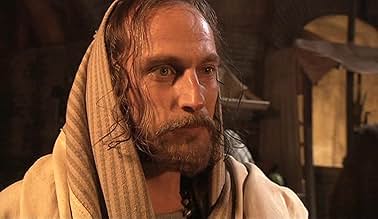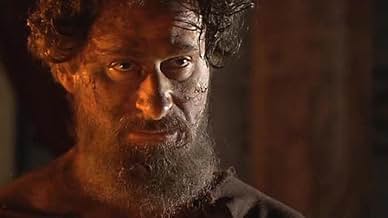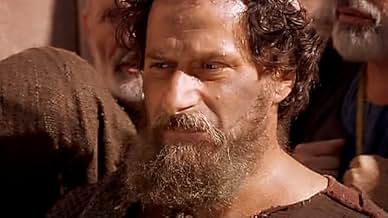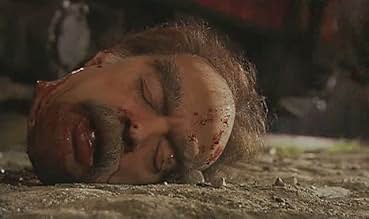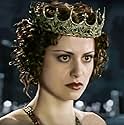IMDb रेटिंग
7.5/10
5.1 हज़ार
आपकी रेटिंग
अपनी भाषा में प्लॉट जोड़ेंThe devil and his attendants visit Moscow at the times of the Stalin regime. Official atheistic ideology confronts with a series of supernatural events.The devil and his attendants visit Moscow at the times of the Stalin regime. Official atheistic ideology confronts with a series of supernatural events.The devil and his attendants visit Moscow at the times of the Stalin regime. Official atheistic ideology confronts with a series of supernatural events.
- पुरस्कार
- 3 कुल नामांकन
एपिसोड ब्राउज़ करें
फ़ीचर्ड समीक्षाएं
I watched this mini on a DVD so my perception wasn't as fragmented as it perhaps would have been if I watched one episode a day on TV. I read 'Master and Margarita' at least ten times so I know it pretty much by heart. It came as a relief that Bortko followed the original text so closely and didn't turn it in one of Hollywood 'junk' adaptations. There's no point in getting hysterical about the fact that this film is not as good as the book it could never be. I agree with other comments here that many dialogues are 'still born' because the text was transferred from the book too literally with no dramatic adaptation, particularly when Bulgakov's 'author's' commentaries were used in the dialogues. Abdulov and Basilashvili were the best. To my mind, Basilashvili, in particular, added to my previous perception of Woland and expanded this character if that's at all possible. The main complains are Begemot all of whose personifications failed miserably and Gaft's character who was completely out of context and rather weird. Gaft already played Beria in another movie and his appearance here looked like a piece cut out from that movie and pasted into this one. However this is all minor and generally I enjoyed the film. I was only really disappointed with Bortko's interpretation of the Ball. Having followed the book so maniacally to the last letter he suddenly deviated off track and not in a good way. In Bulgakov's book the Ball is an explosion of colour, light and music with walls of flowers and rainbow fountains. Whether it was a poor budget to blame or inability to use decent special effects but Bortko created some grey depressing place in the middle of nowhere which looked rather bizarre. Bulgakov featured Margarita flying through the ball halls in shoes made of rose petals and wearing nothing except heavy pendant over her neck whereas Bortko dressed her in torture chains and pinned her to the ground. It all looked a bit sado-masochistic and I doubt Bulgakov saw it that way. I'm surprised no one here commented on it. All in all I think it's not a bad attempt, certainly for a mini. I was expecting something much worse having seem some of the rubbish produced my Russian movie makers these days. To those who say it's awful, I think you should calm down and accept that Bulgakov's book and this movie are completely separate entities and the film can't be as deep because it can't reproduce all the philosophical richness of the literary work. It could try but then it won't appeal to a wider audience which prefers easily digestible adaptations.
I can't add much to the other reviews already posted here. As someone who loves Bulgakov's novel (in English translation), I was impressed and moved by this very faithful adaption to the screen. I am not sure if someone who had not read the book first would fully appreciate the work and would strongly recommend doing so before seeing the film.
There are a few minor changes from the book, some omissions and a few additions, but nothing that really changes it. The portrait of Jesus (Yeshua Ha-Notzri) and his execution are deeply moving. The major characters of Satan (Woland), the Master, Margarita and Pontius Pilate are wonderfully acted. So also are the minor characters, too numerous to list here.
One thing did puzzle me, the poor quality of the English sub-titles. Again, knowing the book minimizes the problem, but still in 2005, couldn't they have found a better translator, or used the dialog from one of the fine translations of the book?
I must give my thanks to all the people involved in this production who have given new life to Bulgakov's masterpiece.
There are a few minor changes from the book, some omissions and a few additions, but nothing that really changes it. The portrait of Jesus (Yeshua Ha-Notzri) and his execution are deeply moving. The major characters of Satan (Woland), the Master, Margarita and Pontius Pilate are wonderfully acted. So also are the minor characters, too numerous to list here.
One thing did puzzle me, the poor quality of the English sub-titles. Again, knowing the book minimizes the problem, but still in 2005, couldn't they have found a better translator, or used the dialog from one of the fine translations of the book?
I must give my thanks to all the people involved in this production who have given new life to Bulgakov's masterpiece.
just a masterpiece. as adaptation of a masterpiece. the key - high loyalty to the book. and the science to resurrect an universe who becomes fascinating in this trip across characters and magnificent images and spectacular artistic options and wise choices for the portrait of each character. more than a masterpiece, it is a refined delight. and this detail did it great. because it reflects the profound respect of Russian cinema for the national literature. and, in same measure, the science to build a fresco.
"Master and Margarita", the book and the movie:
I have read "Master and Margarita" three times, and I am sure that I will read it again. I was very lucky because all three times I read it in Russian, and even the best translation can not compare to the original. Every time, I found something new in the book; it would turn to me by different facets. "Master and Margarita" is incredibly beautiful, deep, sophisticated yet playful and sparkling book with unforgettable characters. In fact, it is not one novel but three. First, about the adventures of the Devil and his company in 1920's Moscow; second, about Pontius Pilatus and Jesus in Jerusalem of the first century, and the third one, about the Master, the writer who wrote the second novel, and his eternal and true love, Margarita. The story of Master and Margarita is the story of Bulgakov and his wife and muse, Elena. All three stories are interconnected and intertwined. All three end with the exactly same phrase, "...the cruel fifth procurator of Judea, the equestrian Pontius Pilatus."
So, what is the book about? Good, evil, betrayal, talent, love, forgiveness? Yes, it is. But it is so much more.
I had a lot of doubts before watching the film because as much as I wanted to see "Master and Margarita" on screen I was not sure that it was possible to adapt it and not to lose anything significant - which is everything.
I am pleasantly surprised - the film is very good. It is respectful, thoughtful and as close to the spirit of the greatest Russian novel of the last century as possible.
The movie is not perfect (and I don't think that the perfect transfer is possible) but the choice of actors, the music score, the visual palette that change as we enter the different eras, places, and dimensions are outstanding. I was initially surprised by some names but almost every actor proved him/herself very capable in bringing to the screen well known and beloved characters. I would say that some of special effects could be ...well, more special - for example, the mischievous talking cat Behemoth could be done more interestingly. I also don't see the exact reason for creating a new character, the man in uniform with the glasses and very recognizable accent who is in charge of investigating the "crimes of the band of powerful hypnotists" - how they call Woland and his entourage. One can argue that the titular couple, the tragic lovers, Master and Margarita are weaker and their story seems pale in the comparison to one of Pilatus
(bravo to 80 year old stage and screen legend, Kirill Lavrov who can be remembered as Ivan Karamazov in The Brothers Karamazov (1969) and Ieshua Ha-Notsri (incredible performance by the young bright star, Sergei Bezrukov of "Brigada"'s fame, almost unrecognizable as Ieshua). I think no one can deny that Oleg Basilashvili as powerful, cynical and eternally wise Woland, the part of Power " Which wills forever evil Yet does forever good" IS the true Master of the series. My fascination and admiration belong to Alexander Abdulov on whom I as a young girl had a huge crush in his early film "Obyknovennoye Chudo" . For many years he had been the Russian sex symbol but his enormous comical talent found its match in the part of Woland's assistant/ translator, Koroviev. His and Behemoth's adventures in Moscow are screamingly funny. I think that the film is a successful and enjoyable adaptation of the beloved cult novel and I recommend seeing it. I am going to order the sound track. As I mentioned, the music by Igor Kornelyuk is one of the film's treasures.
P.S. I used to work on the street where the last home of Mikhail Bulgakov was. He was taken to the cemetery from there.
The famous "Pashkov's House" with the rotunda on the top where Woland and his team gathered together before they left Moscow forever, was in walking distance from my work, and I remember, once, I almost got hit by a car -I walked and looked at that music in stone and could not take my eyes off it.
I have read "Master and Margarita" three times, and I am sure that I will read it again. I was very lucky because all three times I read it in Russian, and even the best translation can not compare to the original. Every time, I found something new in the book; it would turn to me by different facets. "Master and Margarita" is incredibly beautiful, deep, sophisticated yet playful and sparkling book with unforgettable characters. In fact, it is not one novel but three. First, about the adventures of the Devil and his company in 1920's Moscow; second, about Pontius Pilatus and Jesus in Jerusalem of the first century, and the third one, about the Master, the writer who wrote the second novel, and his eternal and true love, Margarita. The story of Master and Margarita is the story of Bulgakov and his wife and muse, Elena. All three stories are interconnected and intertwined. All three end with the exactly same phrase, "...the cruel fifth procurator of Judea, the equestrian Pontius Pilatus."
So, what is the book about? Good, evil, betrayal, talent, love, forgiveness? Yes, it is. But it is so much more.
I had a lot of doubts before watching the film because as much as I wanted to see "Master and Margarita" on screen I was not sure that it was possible to adapt it and not to lose anything significant - which is everything.
I am pleasantly surprised - the film is very good. It is respectful, thoughtful and as close to the spirit of the greatest Russian novel of the last century as possible.
The movie is not perfect (and I don't think that the perfect transfer is possible) but the choice of actors, the music score, the visual palette that change as we enter the different eras, places, and dimensions are outstanding. I was initially surprised by some names but almost every actor proved him/herself very capable in bringing to the screen well known and beloved characters. I would say that some of special effects could be ...well, more special - for example, the mischievous talking cat Behemoth could be done more interestingly. I also don't see the exact reason for creating a new character, the man in uniform with the glasses and very recognizable accent who is in charge of investigating the "crimes of the band of powerful hypnotists" - how they call Woland and his entourage. One can argue that the titular couple, the tragic lovers, Master and Margarita are weaker and their story seems pale in the comparison to one of Pilatus
(bravo to 80 year old stage and screen legend, Kirill Lavrov who can be remembered as Ivan Karamazov in The Brothers Karamazov (1969) and Ieshua Ha-Notsri (incredible performance by the young bright star, Sergei Bezrukov of "Brigada"'s fame, almost unrecognizable as Ieshua). I think no one can deny that Oleg Basilashvili as powerful, cynical and eternally wise Woland, the part of Power " Which wills forever evil Yet does forever good" IS the true Master of the series. My fascination and admiration belong to Alexander Abdulov on whom I as a young girl had a huge crush in his early film "Obyknovennoye Chudo" . For many years he had been the Russian sex symbol but his enormous comical talent found its match in the part of Woland's assistant/ translator, Koroviev. His and Behemoth's adventures in Moscow are screamingly funny. I think that the film is a successful and enjoyable adaptation of the beloved cult novel and I recommend seeing it. I am going to order the sound track. As I mentioned, the music by Igor Kornelyuk is one of the film's treasures.
P.S. I used to work on the street where the last home of Mikhail Bulgakov was. He was taken to the cemetery from there.
The famous "Pashkov's House" with the rotunda on the top where Woland and his team gathered together before they left Moscow forever, was in walking distance from my work, and I remember, once, I almost got hit by a car -I walked and looked at that music in stone and could not take my eyes off it.
The user review first to pop up when one opens the IMDb page is not only unfair, but IMHO idiotic. This is a masterpiece you MUST see.
As everybody who has read the novel knows (and I have read it at least four times), Master i Margarita is a 20th century masterpiece, perhaps THE 20th century masterpiece as far as novels are concerned. Theoretically, it is impossible to adapt to film. Yet Vladimir Bortko managed in this mini-series to convey to the viewer all the magical beauty, as well as the penetrating political satire, of the novel.
Of all the scenes/themes of the novel, only a single one is missed: the hoarders of hard currency locked in a theater for re-education and recanting. It is an inexplicable omission, however it does not affect the value of the mini-series. Then there are matters where one cannot follow Vladimir Bortko, as for instance the (IMHO) inconsistent alteration between BW and color. But just watch the mini-series, and you are lifted into a world of magic - magic realism for that matter. All actors are accomplished theater actors: close your eyes and you can imagine them playing Chechov on stage. The Russian they speak is seductively beautiful. I do not speak the language, and mini-series like this make me regret it: a friend of mine (native speaker) who watched it together with me was constantly laughing or frowning at parts of the video where the English subtitles gave no clue of anything. And, from a male viewer's perspective (Bulgakov was if anything a skirt chaser), you have to watch it even just for the pleasure of voyeurism. Anna Kovalchuk as Margarita is fragile, beautiful, erotic, daemonic: the woman you had always wished you had loved, and be loved by her in return. Dela the witch/vampiress is extremely seductive. And the eroticism of some scenes, most notable the Spring Ball with all these beautiful women clad only in jewelry, feathers and stiletto high-heels is, I think, impossible to beat.
I give it only 9/10, because 10/10 goes to the novel.
As everybody who has read the novel knows (and I have read it at least four times), Master i Margarita is a 20th century masterpiece, perhaps THE 20th century masterpiece as far as novels are concerned. Theoretically, it is impossible to adapt to film. Yet Vladimir Bortko managed in this mini-series to convey to the viewer all the magical beauty, as well as the penetrating political satire, of the novel.
Of all the scenes/themes of the novel, only a single one is missed: the hoarders of hard currency locked in a theater for re-education and recanting. It is an inexplicable omission, however it does not affect the value of the mini-series. Then there are matters where one cannot follow Vladimir Bortko, as for instance the (IMHO) inconsistent alteration between BW and color. But just watch the mini-series, and you are lifted into a world of magic - magic realism for that matter. All actors are accomplished theater actors: close your eyes and you can imagine them playing Chechov on stage. The Russian they speak is seductively beautiful. I do not speak the language, and mini-series like this make me regret it: a friend of mine (native speaker) who watched it together with me was constantly laughing or frowning at parts of the video where the English subtitles gave no clue of anything. And, from a male viewer's perspective (Bulgakov was if anything a skirt chaser), you have to watch it even just for the pleasure of voyeurism. Anna Kovalchuk as Margarita is fragile, beautiful, erotic, daemonic: the woman you had always wished you had loved, and be loved by her in return. Dela the witch/vampiress is extremely seductive. And the eroticism of some scenes, most notable the Spring Ball with all these beautiful women clad only in jewelry, feathers and stiletto high-heels is, I think, impossible to beat.
I give it only 9/10, because 10/10 goes to the novel.
क्या आपको पता है
- ट्रिवियाThe film contains 163 minutes of special computer generated effects.
- कनेक्शनFeatured in Legendy mirovogo kino: Kirill Lavrov
टॉप पसंद
रेटिंग देने के लिए साइन-इन करें और वैयक्तिकृत सुझावों के लिए वॉचलिस्ट करें
विवरण
- रिलीज़ की तारीख़
- कंट्री ऑफ़ ओरिजिन
- आधिकारिक साइट
- भाषा
- इस रूप में भी जाना जाता है
- The Master and Margarita
- फ़िल्माने की जगहें
- उत्पादन कंपनियां
- IMDbPro पर और कंपनी क्रेडिट देखें
- चलने की अवधि50 मिनट
- रंग
- ध्वनि मिश्रण
इस पेज में योगदान दें
किसी बदलाव का सुझाव दें या अनुपलब्ध कॉन्टेंट जोड़ें


